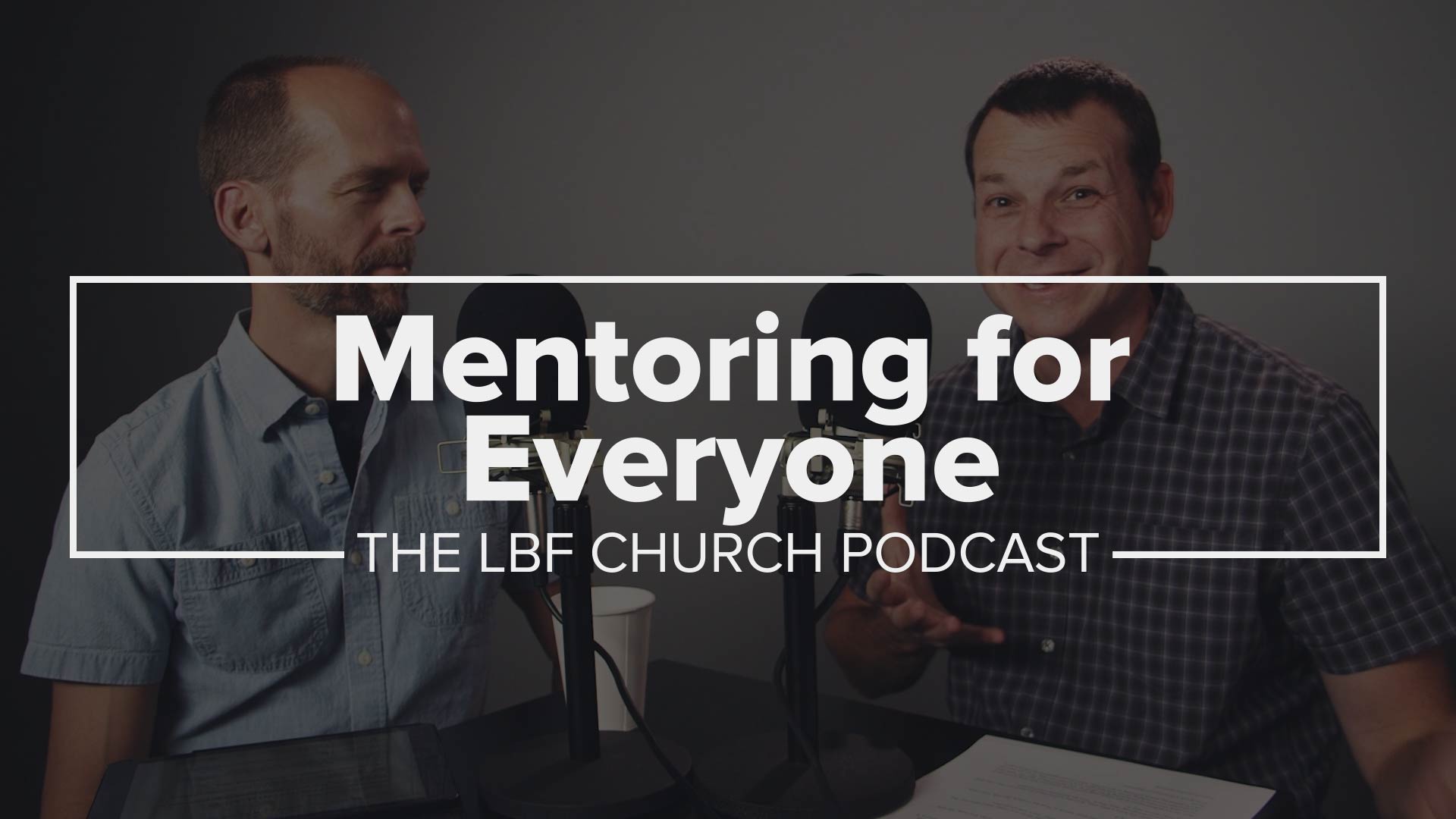
Mentoring for Everyone
by Troy Spilman
The topic of mentoring is one that is often intimidating to a lot of Christians. When the subject of mentoring arises, there are probably many people who read this and think, “That’s not for me.” For anyone who is thinking that, my goal is to try to convince you that mentoring is something that you can be a part of. I want to take the “scary” out it and walk through some straightforward steps that are very doable for anyone who is willing to take a step of faith.
If you look at the Great Commission in Matthew 28:19-20, Jesus says that we are to, “Go therefore and make disciples of all nations, baptizing them in the name of the Father and of the Son and of the holy Spirit, teaching them to observe all things that I have commanded you…” In the original language, the “Go,” carries the idea of “as you are going.” The idea is that as you are going about life, wherever you are, you are to be about helping to make disciples. We often disqualify ourselves by thinking that since I’m not called to go on the mission field in Africa or some other far off place, that I am off the hook with this idea of “making disciples.”
But nothing could be further from the truth. The original disciples were ordinary people like us with their own flaws and weaknesses, who were willing to obey Jesus while being empowered and led by the Holy Spirit to make disciples. Jesus made disciples by investing in them, then these disciples went and made disciples who also made more disciples and then fast-forward to where we are today. We are here as a church today because this process was passed along, and each one of us has a part to play.
I really like to define a disciple as “someone who knows Christ, grows in Christ and goes for Christ.” Think of it, we each get to help in this process of people moving forward in their faith where they can then use their God-given gifts in serving others. We are going to walk through a five-step process that is incredibly helpful. These steps came from the book Exponential by Dave Ferguson & John Ferguson. Step One for mentoring someone is “I do. You watch. We talk.” This creates a safe environment where someone can learn the practical steps of actually doing ministry. When I was learning to ride my bike as a kid, my brother and his friends got me a skateboard helmet, knee pads, elbow pads and a big puffy jacket, I looked like the Stay-Puff marshmallow man. The idea is that as I was learning how to stay upright, I was in a relatively safe environment that would keep me from harm.
With this first step of “I do. You watch. We talk,” the mentor demonstrates ministry in action, this could be learning to teach a short bible lesson, be a greeter at church, help out in children’s ministry, lead worship, etc. For me, this is how I learned how to do a “hospital visit” and bring care and comfort to someone who is going through a difficult time physically. I would watch my mentor as he would greet the person and family members, ask some questions, read a Scripture or two and then prayer for them. Then afterward we would debrief and talk about it.
Step two is, “I do. You help. We talk.” This is a tag-team approach, literally trading off back and forth between the mentor and mentee. Back to the hospital example, my mentor would read a short passage, then I read a passage, he started the prayer, I finished the prayer. He was clearly in the lead role and I was clearly in the support role. Then we could debrief and talk through some of the details. For instance, I remember being thrown off by the noisy machines beeping, and I had to learn to push through the distractions. I have found that when it comes to mentoring, often so much more is caught than taught.
Okay, now the move from step two to step three is a really important one. We move from “I do, You help” to “You do, I help.” This is where the tables turn, but there is still the security of the mentor being present and involved, but now the mentee takes the lead. Clearly the mentor still has a role, but a minor one. The mentor has to resist the urge of “rescuing” the mentee if things don’t go precisely as planned. If we use the example of facilitating a Bible study in a Life Group setting, this is where the one being mentored would take the lead. He or she has seen their mentor do it several times and has even helped, now they are in control. The mentor has a role, but a very reduced one, it clear that the authority has shifted. The debrief afterward is very important because there are a lot of fine-tuning needed that are only discovered by doing. Such things as, “How long should I pray?”, “How long do I wait in silence for someone to answer a question I put out there?”, etc.
Now we move to step four, which is “You do. I watch. We talk.” This is where the mentee “owns” the ministry and takes full responsibility. The mentor is still on-hand, but just as an observer. The disciples had been watching Jesus for a long time do ministry, then there was the day that He sent them out to do the ministry themselves. They came back so exciting at how the Lord had used them. This reminds me when I was taking the lead for a jail visit and I was placed in the wrong cell with the wrong inmate. I couldn’t get ahold of any of the guards and was stuck there for about 45 minutes. Since I had been to the jail a few times, I knew how things worked, so I was able to now adjust when I was given a curveball. The inmate I was put with had just been arrested for robbing bank with several other guys, all out of town, and was only 18 years old. I was able to point Him to Jesus and share the message of hope with him during that time. It really was a divine appointment. Since my mentor had done a good job in preparing me, I felt fairly confident in this situation also.
And finally, we have a fifth step. This is important because it is the step that keeps the process going. Step five is “You do. Someone else watches.” The whole goal of discipleship is reproduction. The idea is that I train someone to do the work of the ministry so that they can train someone else and so on. This is where the mentee now becomes the mentor and brings someone else into the work of the ministry as an observer just as they were at one point. When I started to mentor someone else, I had lots of compassion for their nervousness since memories of me being nervous the first few times were still very fresh. We are called to pass the torch just like Moses did with Joshua, David did with Solomon, Paul did with Timothy, and Jesus did with His disciples. This is how Kingdom ministry is carried forward.
I want to encourage you and let you know that YOU can do this! You can pour into someone else and walk with them through these five steps to carry on the work of the ministry. I want you to see yourself as a coach that simply helps a disciple get to the next level spiritually. I would challenge you to pray and see if there is someone that you should ask about being in a mentoring relationship, this could be formal or informal. Maybe you realize that you are the one who needs to be mentored, I would say the same thing, pray about it and see if there is someone in your life who you could ask to take on this role. If you are stuck in either side of this equation, I encourage you to talk with your pastor or one of the pastors/leaders here at LBF or contact me (Troy Spilman, Local/Global Serving Pastor) – troy@lbfchurch.com.

')); } } else if (elem.tagName == 'SELECT') { var selected = true; if (elem.multiple) { selected = false; for (var i = 0; i < elem.options.length; i++) { if (elem.options[i].selected) { selected = true; break; } } } else { for (var i = 0; i < elem.options.length; i++) { if (elem.options[i].selected && !elem.options[i].value) { selected = false; } } } if (!selected) { elem.className = elem.className + ' _has_error'; no_error = false; tooltip = create_tooltip(elem, "Please select an option."); } } else if (value === undefined || value === null || value === '') { elem.className = elem.className + ' _has_error'; no_error = false; tooltip = create_tooltip(elem, "This field is required."); } } if (no_error && elem.name == 'email') { if (!value.match(/^[\+_a-z0-9-'&=]+(\.[\+_a-z0-9-']+)*@[a-z0-9-]+(\.[a-z0-9-]+)*(\.[a-z]{2,})$/i)) { elem.className = elem.className + ' _has_error'; no_error = false; tooltip = create_tooltip(elem, "Enter a valid email address."); } } if (no_error && /date_field/.test(elem.className)) { if (!value.match(/^\d\d\d\d-\d\d-\d\d$/)) { elem.className = elem.className + ' _has_error'; no_error = false; tooltip = create_tooltip(elem, "Enter a valid date."); } } tooltip ? resize_tooltip(tooltip) : false; return no_error; }; var needs_validate = function(el) { if(el.getAttribute('required') !== null){ return true } if(el.name === 'email' && el.value !== ""){ return true } return false }; var validate_form = function(e) { var err = form_to_submit.querySelector('._form_error'), no_error = true; if (!submitted) { submitted = true; for (var i = 0, len = allInputs.length; i < len; i++) { var input = allInputs[i]; if (needs_validate(input)) { if (input.type == 'text') { addEvent(input, 'blur', function() { this.value = this.value.trim(); validate_field(this, true); }); addEvent(input, 'input', function() { validate_field(this, true); }); } else if (input.type == 'radio' || input.type == 'checkbox') { (function(el) { var radios = form_to_submit.elements[el.name]; for (var i = 0; i < radios.length; i++) { addEvent(radios[i], 'click', function() { validate_field(el, true); }); } })(input); } else if (input.tagName == 'SELECT') { addEvent(input, 'change', function() { validate_field(this, true); }); } else if (input.type == 'textarea'){ addEvent(input, 'input', function() { validate_field(this, true); }); } } } } remove_tooltips(); for (var i = 0, len = allInputs.length; i < len; i++) { var elem = allInputs[i]; if (needs_validate(elem)) { if (elem.tagName.toLowerCase() !== "select") { elem.value = elem.value.trim(); } validate_field(elem) ? true : no_error = false; } } if (!no_error && e) { e.preventDefault(); } resize_tooltips(); return no_error; }; addEvent(window, 'resize', resize_tooltips); addEvent(window, 'scroll', resize_tooltips); window['recaptcha_callback'] = function() { // Get all recaptchas in the DOM (there may be more than one form on the page). var recaptchas = document.getElementsByClassName("g-recaptcha"); for (var i in recaptchas) { // Set the recaptcha element ID, so the recaptcha can be applied to each element. var recaptcha_id = "recaptcha_" + i; recaptchas[i].id = recaptcha_id; var el = document.getElementById(recaptcha_id); if (el != null) { var sitekey = el.getAttribute("data-sitekey"); var stoken = el.getAttribute("data-stoken"); grecaptcha.render(recaptcha_id, {"sitekey":sitekey,"stoken":stoken}); } } }; _load_script("//www.google.com/recaptcha/api.js?onload=recaptcha_callback&render=explicit"); window._old_serialize = null; if (typeof serialize !== 'undefined') window._old_serialize = window.serialize; _load_script("//d3rxaij56vjege.cloudfront.net/form-serialize/0.3/serialize.min.js", function() { window._form_serialize = window.serialize; if (window._old_serialize) window.serialize = window._old_serialize; }); var form_submit = function(e) { e.preventDefault(); if (validate_form()) { // use this trick to get the submit button & disable it using plain javascript document.querySelector('#_form_3_submit').disabled = true; var serialized = _form_serialize(document.getElementById('_form_3_')).replace(/%0A/g, '\\n'); var err = form_to_submit.querySelector('._form_error'); err ? err.parentNode.removeChild(err) : false; _load_script('https://lbfchurch.activehosted.com/proc.php?' + serialized + '&jsonp=true'); } return false; }; addEvent(form_to_submit, 'submit', form_submit); })();